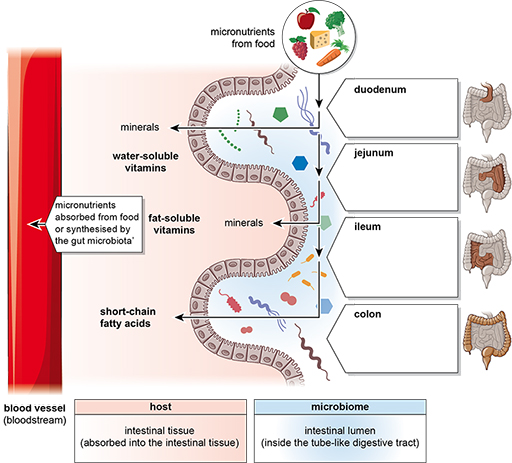2.2 Metabolic – production of nutrients
In addition to digesting the food we eat to provide the human host with nutrients, the gut microbiome also manufactures important micronutrients, such as vitamins and minerals, which are essential to the survival of the human host and other microbiota. For example, the B vitamins are all synthesised by the microbiome. In addition, the microbiota increases absorption of other dietary vitamins and minerals in different parts of the GI tract.
Figure 8 shows some of the dietary micronutrients and SCFAs produced by the microbiome and absorbed across the host gut wall.

Fun fact: why is it called the ‘small’ intestine?
The length of the tube that forms the small intestine is around 6 metres in an adult, compared to the length of the tube forming the large intestine, which is only around 1.5 m in length. So, you might wonder why the small intestine is called ‘small’. The name refers to the diameter of tube, rather than length. The diameter of the small intestine is much smaller than that of the large intestine.
The B vitamins synthesised by the gut microbiome are important in the generation of energy in the cells. Some bacterial groups in the gut microbiome, such as Firmicutes and Bacteroides, synthesise:
- fat-soluble vitamins such as vitamin A, D, E, and K (around half the daily requirement of vitamin K is provided by gut bacteria)
- water-soluble vitamins – B vitamins such as folate, thiamine, biotin, riboflavin and pantothenic acid, and vitamin C.
The gut microbiome is an important additional source of the water-soluble vitamins, as levels of these vitamins in food are often inadequate and they cannot be stored in the body.
